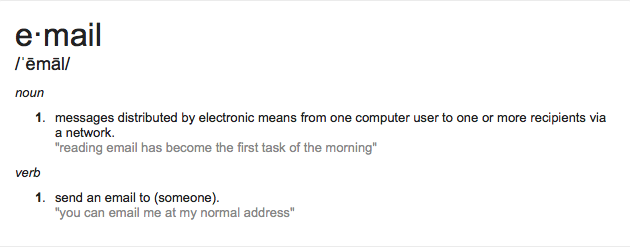
Why do you use email? Stop for a minute and really think about this question. For most working age folks the answer is simply that email is all they know–it has controlled the workplace for their entire careers. We could write several posts about how some people believe answering emails equates to work product, and the ability of email to control your day is another topic worthy of discussion. But a deeper analysis begs the question: when is email the right tool for the job? Let’s consider a few attributes of the email, which always becomes a central focus of litigation.
Email records are persistent The definition above has a key word deserving our focus: “network.” When you send an email, the message doesn’t go straight to the recipient. It travels all over creation, and unlike paper mail, copies of those messages are stored along the way. So the first thing you should remember is that when you send an email, you are not communicating, you are writing history. If you want end-to-end encryption, get WhatsApp or Signal. However, you should always remember that what you write should be what you want that judge and jury to understand 4 years from now.
Emails are passive. Contrary to popular belief, emails do not drive action because they are a one-way communication tool. If your house was burning, would you email the fire department? Would you email the police to report a burglary? So why in the hell would you email your lawyer to report a problem that requires immediate attention? Calls for prompt action require a request and a confirmation, which is best delivered face to face or at least by phone.
The written word is still a new technology. Humans have evolved over millions of years to collaborate using interpersonal communication. Writing didn’t emerge until about 3200 BC. So if we were born yesterday, writing didn’t hit the block until about 15 minutes ago. Why is this relevant? Humans are most effective when communicating face to face. The next best thing is a phone call where vocal tones and inflection aide understanding, while the written word comes in as only a third best alternative. More importantly, we develop ideas by talking them through. Writing is actually a complex form of thinking, which is why psychologists use it to help their patients. It’s a very good idea to write down your thoughts and help construct your ideas BEFORE you communicate them. Thinking out loud into a keyboard is a recipe for disaster.
Humans are inherently tribal. We coalesce around identity structures to form groups and collaborate after developing a bond of personal interaction under shared purpose. That’s a fancy way of saying that people you don’t spend time with will look at you as an outsider and not listen to a damn thing you say. So, if you want to get things done, pick up the phone and schedule a meeting that has a time cap and a purpose. Spending time together toward a common goal will help you collaborate and achieve results faster.
So what does all this mean for you, the blog reader? First, you should question whether sending that email is the best way to communicate the ideas in your head and produce the desired outcomes. Second, remember that everything you write in an email becomes an historical record. (All trial lawyers view the production of the opposing party’s email file like Christmas morning.) Your emails should reflect what you want history to record, not the stream of consciousness running through your head to tell that *&^*^$# #^%$&^ how you really feel. Lastly, how does this email affect the relationship you have with the receiving party? If it’s not helping, then you’re probably not going to get any kind of result you desire. So then why are you sending an email anyway?




